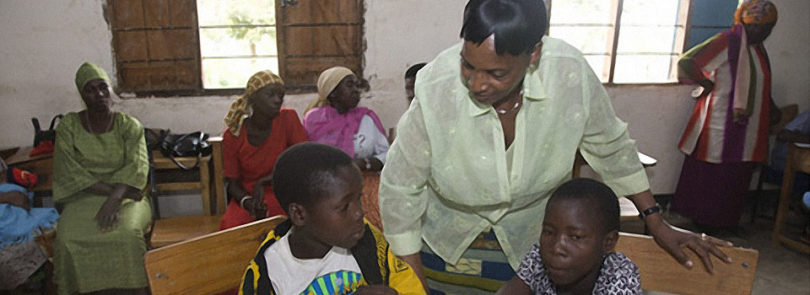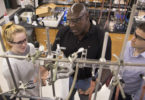The girls gather in groups of three on the cement floor of the Bukongo Day School on Tanzania’s Ukerewe Island and stare at the blank paper and crayons before them.
Express yourself through pictures or words, UGA student Koqunia Forte tells the mostly 12- to 15-year-olds through an interpreter, who translates her English into their native Swahili.
No one moves. After a few seconds, Forte, a master’s degree student in theater, kneels on the floor next to one of the girls. She picks up a crayon and starts writing on a sheet of paper: Happy. Glad. Play. She turns the page over and starts drawing a picture of herself, using pink for her loosely braided hair and green for her eyes and glasses.
The girls laugh and pick up crayons to begin the assignment.
“They do not understand how to draw,” UGA Professor Lioba Moshi says. “They do not have confidence; they do not think they can do anything.”
Indeed, when the girls are asked to share their self-descriptions with the group, none volunteer. Finally, Anastazia Marwa, 12, dressed in the white shirt and blue pleated skirt required of students at the Bukongo School walks to the front of the room and in a tiny voice begins to read what she’s written.
“When I grow up, I’d like to be a teacher,” she says in Swahili, which is translated into English for the UGA students. “I like reading. I like sports.”
This is just the beginning. Over the next four weeks, the UGA students will come to the Bukongo School to meet with the girls, who are part of a program called Girls Talk, aimed at building self-esteem and empowering emerging women in the patriarchal society.
Girls Talk is one of three projects that the UGA students and faculty engaged in with Ukerewe residents during their month-long service learning trip to Tanzania. The trip was part of a three-year-old partnership between UGA and Gertrude Mongella, a Ukerewe native and member of the African parliament who was awarded the Delta Prize for Global Understanding in 2005. The goal is to work with the people of Ukerewe to develop strategies and programs for sustainable growth. For the students, it is an opportunity to live in and learn about a culture that is vastly different from their own.
Khadija Hill, an consumer economics major, recaps their first visit to the Girls Talk program at Bukongo School, where the children performed for the students.
“Most of their songs were about AIDS. Most were about abstinence,” Hill says. “It was pretty overwhelming.”








